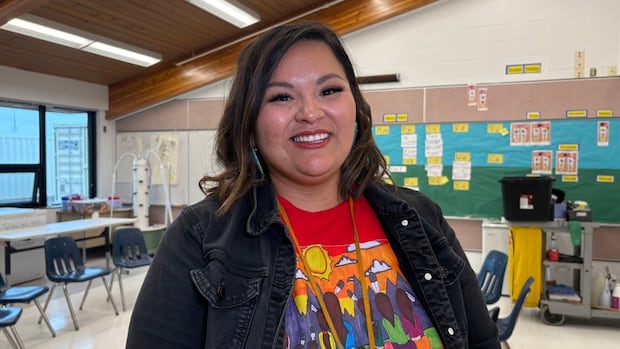
He is a ‘safe person’ for his niece. Now she runs aunt program for other indigenous girls
Maxin Paigan says that the aunt program was inspired by her own niece.
“I have six nieces between the ages of five and 16,” she said. “Each of them is influenced by social issues that we are all faced here in Canada.”
Originally in Suskechewan, a registered mental health physician Paigan, a registered mental health physician in Suskechewan, created an eight -week aunt program, focusing on social issues that affect young indigenous girls in small first nation communities.
She is proud to provide a safe and supportive place for her niece when she needs to talk.
“If I can be a safe person for my niece, I need to create a program for other children, only other than counseling. This is such that it is how it is all types of snowball together.”
Last month, Pagan was invited to Papicis Cree Nation, 115 km north of Regina, to work with a group of girls aged 12 to 17 at the pacecastyu school. He went on eight main topics, but also worked in deep conversations.
While discussing healthy relationships and boundaries, Pegan said that one of the girls was stuck with her.
“I think my mother is now the way he is,” Paigan calls him.
It was worthwhile to help these girls to recognize these things in their lives and learn to heal.

Cherish Desomie-Bird, from Peepeekisis Cree Nation, said that he enjoyed the program.
“We learned about our historical methods, and when we took residential schools away from us, we lost them.” “Now they are trying to bring it back to us and I am grateful for it.”
Desomi-Burd said that the program has helped him to speak confidently in a group setting.
“I think I am going to keep it with me, because I am sometimes shy and I feel overwhelmed, and I can’t find the right words,” he said. “But when I came here and when he started talking about stories … I started coming out of my shell.”
Desomi-Bard said that she wants to feel proud of her Musum and Kokum, especially after discussion about residential schools.
“My Musum and Kokum went to the residential school and I know they had a difficult time.”

The event included the circles talking, where they talked about the ideas of suicide, sorrow and loss, healthy relationships and boundaries.
Peigan said that a lot of girls are dating, so they pass through red flags in relationships – what they look and how they protect themselves. He also talked to him about the consumption of intoxicants and healthy ways to live life.
“Many of these girls have their own stories, and have their own injuries,” she said. “They come here, and they resonate, they are related, they cry. Some things, some are just listening.”

Another participant, Alni Desonomi said that he is happy that he has a chance to be a part of it and he will suggest it to others.
“I learned a lot about mental health, and that no one is right.”
He said that learning about different life cycles – from childhood to adulthood to adulthood – actually stood out for him.
“I might remember everything until I grow up,” she said.
Peigan also invited an elderly man from Pasqua First Nation to talk with girls about prayers and medicines.
He learned how to make drug bags and participated in art therapy.

They passed with passage and girls’ moon time. She said that some girls do not have mothers or aunt, with whom they can interact, or are very embarrassed to ask for self-care items. She offers self-care baskets at the end of the program.
“I grew up in my father’s house and I did not have my mother to buy me a pad and do those things for me. So I know how it is,” she said.

Peigan said that the response after the program is always warm.
“It is almost as if there is a sorrow attack because they do not want it to stop. They want us to keep coming back, or want us to be in school every Wednesday afternoon.
The program for Peepeekisis ended last Wednesday, but Peigan said that girls can always reach her after the program.
“I always tell them,” if you are going through something, reach me, text me. “I usually keep my phone and if I am available, I will come back to you.”
He said that it is about bridging those connections and creating a safe place.
“Some girls still arrive today that I have taught in other schools.”